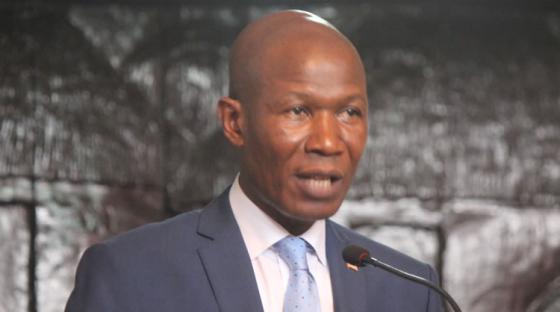Liberia: Bao-Chico MDA ‘Not Revenue Generating’ ?

The Speaker of the 54th Legislature, Bhofal Chambers.
...... … House Threatens to Counter-sue Senate over Interpretation of Article 34d (i)
Members of the House of Representatives voted to invite Cllr. M. Wilkins Wright and Cllr. T. Negbalee Warner to appear before Plenary on March 1, to provide expert opinions with consonance of Article 34d(i) which speaks of other financial bills.
The House’s decision is aimed to counter-sue the Liberian Senate on grounds that the Bao Chico Iron Ore Concession Agreement is part of “other financial bills” which, according to Liberia’s 1986 Constitution, should originate from the House of Representatives.
The House unanimously voted February 24, during the 14th day sitting, when the Supreme Court's verdict was read and noted (accepted) by the House of Representatives.
The Supreme Court ruled that the Senate did not violate any provision of the 1986 Constitution while ratifying the 25-year BAO CHICO Iron Ore Concession Agreement for Gbarpolu County, as claimed by the House.
In an unanimous decision, the Court ruled that the agreement is not a revenue generating one, as claimed by the House of Representatives. Instead, it is a concession agreement that would have emanated from any of the two Houses, Senate or Representatives. Both houses have earlier passed separate versions of the BAO CHICO agreement.
Therefore, the court further ruled that there was no constitutional violation by the House of Senate, as being argued by the House of Representatives.
In Tuesday's Session, a cross-section of the lawmakers, including Reps. Vicent Willie, Acarous Gray, Dixon Seboe, Francis Dopoe among others, indulged their colleagues to agree for a counter-suit, arguing that though the BAO CHICO Iron Ore Concession Agreement for Gbarpolu County, is not a revenue generating bill, it is part of ‘other financial bills’ which originates from the House of Representatives.
It may be recalled, on November 7, 2021, the version of the bill approved by the Senate, “An Act to Ratify the Mineral Development Agreement between the Government of Liberia and the BAO CHICO Resources of Liberia”, was rejected by the House of Representatives on grounds that revenue bills originate from the House of Representatives.
The controversial Mineral Development Agreement between the Government of Liberia and BAO CHICO Resources Liberia Limited is for the extraction of iron ore, to be operated under a Class “A” Mining License for an initial term of 25 years, in Gbarpolu County, from the time it would have been ratified.
The case grew when members of the Liberian Senate filed a petition before the Supreme Court, where they sought the court to decide the Constitutionality of ratification of the Bao-Chico Mineral Development Agreement by the Liberian Senate, prior to ratification by the House of Representatives.
President George Weah, while submitting the BAO CHICO agreement, said the deal brings huge direct benefits in the forms of employment and revenue, including the payment of all taxes and duties; payments of royalties, and a signature fee of US$3 million.
However, the President did not state the total number of jobs the concession is expected to create.
The company’s investment is in the tune of US$500 million, aimed at improving the country’s economy, creating job opportunities and scholarships for citizens as part of its support to the Government’s Pro-Poor Agenda for Prosperity and Development (PAPD).
The Bao-Chico MDA has been shrouded in controversy since its inception. The MDA, which was submitted by President Weah for ratification, seeks to grant the Bao Chico Resources Liberia a Limited Class A mining license to extract iron ore for 25 years. And while the President indicated that there will be huge direct benefits in the forms of employment and revenues, including the payment of all taxes and duties, payments of royalties, and a signature fee of US$3 million, there was initially no indication where in Liberia the MDA would be implemented.
The company was originally granted an iron ore exploration mining license in 2008 (MEL 12005) for the exploration of mineral products within the area specified on the license, which covered a total area of 87.4km2 in Bomi County, according to a 2014 LEITI Report. However, the MDA, it was later revealed, is for a concession area in Gbarpolu County, where the company has no record of exploration under the license given. Gbarpolu County is known more for diamond and gold deposits than for iron ore.
Even if it were to be mining iron ore in the area, what infrastructure is required to transport the ore from Gbarpolu County to the point of shipment?
And if that weren’t enough, the MDA sparked serious contention between the Senate and the House of Representatives over which of the two chambers had the right of first scrutiny of the deal. This led to the House of Representatives halting the Senate’s deliberation on the mining concern, citing constitutional violations on the part of the Senate — a move the Senate complained to the Supreme Court of Liberia for redress.
Now, the question of whether or not the MDA is a ‘revenue-generating’ instrument is the issue of contention, suggesting that the MDA is essentially a giveaway.
